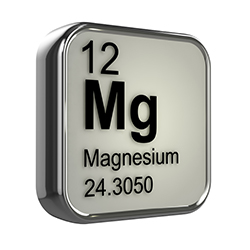Are You Deficient In Magnesium?

Magnesium – the fourth most abundant mineral in the body – is in your bones, teeth, and red blood cells. It is essential for proper functioning of the nervous, muscular and cardiovascular systems, helps maintain bones, promotes normal blood pressure and is involved in energy metabolism.
How do you know if you aren’t getting enough? Signs of magnesium deficiency include:
- Irritability
- Muscle weakness
- Irregular heartbeat
When taking magnesium, consider taking half as much as you do calcium, to offset calcium’s constipating effect and to ensure the appropriate balance of these two key minerals in the body. Look for magnesium citrate, chelate, or glycinate, and avoid magnesium oxide, which can be irritating to the digestive tract.
Good dietary sources of magnesium include truly whole grains, leafy green vegetables (spinach is a great source), almonds, cashews and other nuts, avocados, beans, soybeans and halibut. A diet high in fat may cause less magnesium to be absorbed, and cooking may decrease the magnesium content of food.
Today’s Health Topics
Editor's Pick
Health Focus
Ask Dr. Weil's Q&A










